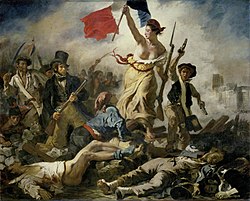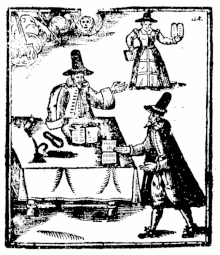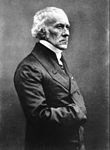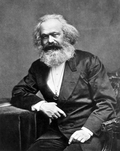English Revolution
This article needs additional citations for verification. (February 2023) |

| Part of a series on |
| Political revolution |
|---|
 |
|
|
The English Revolution is a term that has been used to describe two separate events in English history. Prior to the 20th century, it was generally applied to the 1688 Glorious Revolution, when James II was deposed and a constitutional monarchy established under William III and Mary II.[1]
However, Marxist historians began using it for the period covering the 1639–1651 Wars of the Three Kingdoms and the Interregnum that followed the Execution of Charles I in 1649, before the 1660 Stuart Restoration had returned Charles II to the throne.[2] Writing in 1892, Friedrich Engels described this period as "the Great Rebellion" and the Glorious Revolution of 1688 as "comparatively puny", although he claimed that both were part of the same revolutionary movement.[3]
Although Charles II was retroactively declared to have been the legal and rightful monarch since the death of his father in 1649, [4][5] which resulted in a return to the status quo in many areas, a number of gains made under the Commonwealth remained in law.[6][7]
Whig theory
[edit]Tensions regarding the English monarchy began well before the Glorious Revolution. When Charles I was executed in 1649 by the English Parliament, England entered into a republic, or Commonwealth, that lasted until Charles II was reestablished as king of England in 1660. The intermittent civil wars that lasted between 1649 and 1688 were a “constitutional struggle originating from the unresolved contradictions fostered by the Reformation.”[8] Debates amongst England’s post-Reformation state and the constitutional basis for civil involvement in ecclesiastical and governmental issues continually converged together.[8] During the Glorious Revolution of 1688, King James II was replaced by the monarchs William III and Mary II, and a constitutional monarchy was established that was described by Whig historians as the "English Revolution".[1][9] That interpretation suggests that the "English Revolution" was the final act in the long process of reform and consolidation by Parliament to achieve a balanced constitutional monarchy in Britain, with laws made that pointed towards freedom.[10]
Marxist theory
[edit]The Marxist view of the English Revolution, suggests that the events of 1640 to 1660 in Britain were a bourgeois revolution[11] in which the final section of English feudalism (the state) was destroyed by a bourgeois class (and its supporters) and replaced with a state (and society), which reflected the wider establishment of agrarian (and later industrial) capitalism. Such an analysis sees the English Revolution as pivotal in the transition from feudalism to capitalism and from a feudal state to a capitalist state in Britain.[12][13]
The phrase "English Revolution" was first used by Marx in the short text "England's 17th Century Revolution", a response to a pamphlet on the Glorious Revolution of 1688 by François Guizot.[14] Oliver Cromwell and the English Civil War are also referred to multiple times in the work The Eighteenth Brumaire of Louis Bonaparte, but the event is not directly referred to by the name.[15] By 1892, Engels was using the term "The Great Rebellion" for the conflict, and, while still recognising it as part of the same revolutionary event, dismissed the Glorious Revolution of 1688 as "comparatively puny".[3]
According to the Marxist historian Christopher Hill:
The Civil War was a class war, in which the despotism of Charles I was defended by the reactionary forces of the established Church and conservative landlords, and on the other side stood the trading and industrial classes in town and countryside ... the yeomen and progressive gentry, and ... wider masses of the population whenever they were able by free discussion to understand what the struggle was really about.[16]
Later developments of the Marxist view moved on from the theory of bourgeois revolution to suggest that the English Revolution anticipated the French Revolution and later revolutions in the field of popular administrative and economic gains.[citation needed] Along with the expansion of parliamentary power, the English Revolution broke down many of the old power relations in both rural and urban English society.[citation needed] The guild democracy movement of the period won its greatest successes among London's transport workers, most notably the Thames Watermen, who democratized their company in 1641–43.[citation needed] With the outbreak of civil war in 1642, rural communities began to seize timber and other resources on the estates of royalists, Catholics, the royal family and the church hierarchy. Some communities improved their conditions of tenure on such estates.[citation needed]
The old status quo began a retrenchment after the end of the main civil war in 1646, and more especially after the restoration of the monarchy in 1660, but some gains endured in the long term. The democratic element introduced in the watermen's company in 1642, for example, survived, with vicissitudes, until 1827.[6][7]

The Marxist view also developed a concept of a “Revolution within the Revolution” (pursued by Hill, Brian Manning and others), which placed a greater deal of emphasis on the radical movements of the period (such as the agitator Levellers, mutineers in the New Model Army and the Diggers), who attempted to go further than Parliament in the aftermath of the Civil War.
There were, we may oversimplify, two revolutions in mid-seventeenth-century England. The one which succeeded established the sacred rights of property (abolition of feudal tenures, no arbitrary taxation), gave political power to the propertied (sovereignty of Parliament and common law, abolition of prerogative courts), and removed all impediments to the triumph of the ideology of the men of property – the protestant ethic. There was, however, another revolution that never happened, though from time to time it threatened. This might have established communal property, a far wider democracy in political and legal institutions, might have disestablished the state church, and rejected the Protestant ethic.[17]
Brian Manning claimed:
The old ruling class came back with new ideas and new outlooks which were attuned to economic growth and expansion and facilitated, in the long run, the development of a fully capitalist economy. It would all have been very different if Charles I had not been obliged to summon that Parliament to meet at Westminster on November 3rd, 1640.[18]
Criticism
[edit]The idea, while popular among Marxist historians, has been criticised by many historians of more liberal schools,[19] and of revisionist schools.[20]
The notion that the events of 1640 to 1660 constitute an English Revolution has been criticized by historians such as Austin Woolrych, who pointed out that
painstaking research in the county after county, in local record offices, and family archives, has revealed that the changes in the ownership of the real estate, and hence in the composition of the governing class, were nothing like as great as used to be thought.[21]
Woolrych argues that the notion that the period constitutes an "English Revolution" not only ignores the lack of significant social change contained within the period but also ignores the long-term trends of the early modern period which extend beyond this narrow time frame.
Neither Karl Marx nor Friedrich Engels ever ignored the further development of the bourgeois state beyond that point, however, as is clear from their writings on the Industrial Revolution.[22]
Other uses
[edit]The term "English Revolution" is also used by non-Marxists in the Victorian period to refer to 1642 such as the critic and writer Matthew Arnold in The Function of Criticism at the Present Time: "This is what distinguishes it [the French Revolution] from the English Revolution of Charles the First's time".[23]
References
[edit]- ^ a b Trevelyan 1938, p. ?.
- ^ Trotsky, Leon (1920). "4: Terrorism". Terrorism and Communism – via Marxists Internet Archive.
In the seventeenth century England carried out two revolutions. The first, which brought forth great social upheavals and wars, brought amongst other things the execution of King Charles I, while the second ended happily with the accession of a new dynasty. [...] The reason for this difference in estimates was explained by the French historian, Augustin Thierry. In the first English revolution, in the "Great Rebellion," the active force was the people; while in the second it was almost "silent." [...] But the great event in modern "bourgeois" history is, nonetheless, not the "Glorious Revolution," but the "Great Rebellion."
- ^ a b Engels, Friedrich (1892). "1892 English Edition Introduction". Socialism: Utopian and Scientific – via Marxists Internet Archive.
- ^ House of Commons 1802a.
- ^ Harris, Tim (2005). Restoration: Charles II and His Kingdoms, 1660–1685. London: Allen Lane. p. 47. ISBN 0-7139-9191-7.
- ^ a b O'Riordan, Christopher (1992). "Self-determination and the London Transport Workers in the Century of Revolution". Archived from the original on 26 October 2009.
- ^ a b O'Riordan, Christopher (1993). "Popular Exploitation of Enemy Estates in the English Revolution". History. 78 (253): 184–200. doi:10.1111/j.1468-229X.1993.tb01577.x. Archived from the original on 26 October 2009.
- ^ a b Neufeld, Matthew (2015). "From Peacemaking to Peacebuilding: The Multiple Endings of England's Long Civil Wars". The American Historical Review. 120 (5): 1709–1723. doi:10.1093/ahr/120.5.1709. JSTOR 43697072 – via JSTOR.
- ^ Yerby, George (2020). "Introduction: Recovering the Economic Context of History". The Economic Causes of the English Civil War: Freedom of Trade and the English Revolution. Routledge. pp. 2–3. ISBN 978-0-429-32555-7.
- ^ Richardson, R. C. (1988) [1977]. "3. The Eighteenth Century: The Political Uses of History". The Debate on the English Revolution. Issues in Historiography (2nd ed.). Routledge. pp. 36–55. ISBN 0-415-01167-1.
- ^ Eisenstein (2010), p. 64, quoted in Davidson, Neil (2012). "From Society to Politics; From Event to Process". How Revolutionary Were the Bourgeois Revolutions?. Chicago, Illinois: Haymarket Books. pp. 381–382. ISBN 978-1-60846-067-0.
- ^ Callinicos, Alex (Summer 1989). "Bourgeois Revolutions and Historical Materialism". International Socialism. 2 (43): 113–171 – via Marxists Internet Archive.
- ^ Davidson, Neil (May 2012). "Bourgeois Revolution and the US Civil War". International Socialist Review. No. 83. Center For Economic Research and Social Change.
- ^ Marx, Karl; Engels, Friedrich (1850). "England's 17th Century Revolution: A Review of Francois Guizot's 1850 pamphlet Pourquoi la revolution d'Angleterre a-t-elle reussi?". Neue Rheinische Zeitung Politisch-ökonomische Revue – via Marxists Internet Archive.
- ^ Marx, Karl. "Index". The Eighteenth Brumaire of Louis Bonaparte – via Marxists Internet Archive.
- ^ Hill, Christopher (2002) [1940]. The English Revolution 1640 – via Marxists Internet Archive.
- ^ Hill, Christopher (1991). The World Turned Upside Down: Radical Ideas in the English Revolution (New ed.). Penguin.
- ^ Manning, Brian (1984). "What Was the English Revolution". History Today. 34.
- ^ "Great rebellion, English Revolution or War of Religion?". UK Parliament. Archived from the original on 13 June 2021.
- ^ Stone, Lawrence (2017) [1972]. "Foreword (by Clare Jackson)". The Causes of the English Revolution 1529–1642 (Routledge Classics ed.). Routledge. pp. xiv–xv. ISBN 978-1-315-18492-0.
- ^ Woolrych, Austin (2002). Britain in Revolution, 1625–1660. Oxford: Oxford University Press. p. 794.
- ^ Marx, Karl; Engels, Friedrich. "Marx and Engels: On the Industrial Revolution: Primitive Accumulation and The Condition of the Working Class". Marxists Internet Archive.
- ^ Arnold, Matthew. The Function of Criticism at the Present Time (PDF). Blackmask.
Sources
[edit]- Eisenstein, Hester (13 May 2010). Feminism Seduced: How Global Elites Use Women's Labor and Ideas to Exploit the World. Routledge. ISBN 9781594516603.
- "House of Commons Journal Volume 8: 8 May 1660". Journal of the House of Commons: Volume 8, 1660–1667. London: His Majesty's Stationery Office: 16–18. 1802a.
- Trevelyan, George M. (1938). The English Revolution, 1688-1689 (1965 ed.). Oxford University Press. ISBN 978-7240010488.


